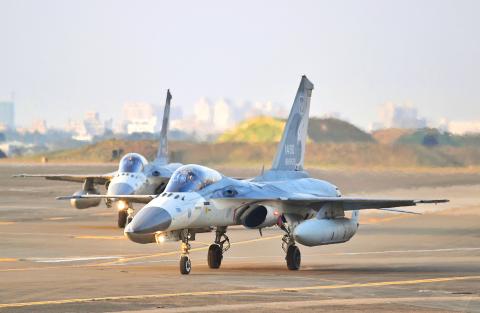The Ministry of National Defense has announced that it plans to develop a new generation of homegrown fighter jets with stealth capabilities as part of the government’s policy to develop an indigenous defense industry.
“Building homegrown aircraft and vessels has become an extremely important policy of the ministry since President Tsai Ing-wen (蔡英文) assumed office. Progress has been made in building indigenous vessels and there is another promise the ministry has to keep, which is to develop a new generation of fighter jets,” Minister of National Defense Feng Shih-kuan (馮世寬) said on Monday.
Feng made the announcement during a meeting with reporters, but did not give any details about the design or functions of the new aircraft.

Photo: CNA
According to reports, the new fighter jet is to be a double-engine stealth plane developed with Taiwanese technology.
The National Chung-Shan Institute of Science and Technology has reportedly been developing the engine technology based on the model fitted on the Indigenous Defense Fighter (IDF).
The air force’s Aviation Technology Research Center is also to be responsible for the development of the new fighter jets.
The research center, though receiving little public attention, is critical for refining the nation’s air defense capabilities in the next 10 to 20 years, Feng said.
While the nation is still seeking to procure F-35Bs, the short takeoff and vertical-landing variant of the US stealth jet that could satisfy the nation’s defense needs due to the vulnerability of air bases, Taiwan has to develop its own fighter jets to maintain its defense capabilities and increase the possibility of procurement, Feng said.
The development of homegrown fighter jets is key to the nation’s defense industry, as Aerospace Industrial Development Corp, which designed and built the IDF when it was an air force research division, is now the nation’s largest defense company, Feng said.
However, senior military analyst Erich Shih (施孝瑋) said that the IDF engine, with its inadequate thrust, could not be used to power next-generation fighter jets.
A capable engine on next-generation fighter jets should produce at least 24,000 pounds of thrust, but an IDF’s two engines can only produce up to 18,000 pounds of thrust, making the IDF engine unfit for the new jets, Shih said.
Since the development of the IDF in the 1990s, Taiwan has made little progress in military aviation or technological cooperation with other nations — such as an aborted plan to partner with an Italian manufacturer to build trainer jets for the air force — but building new jets is a more efficient option, both technologically and financially, to advance the nation’s aerospace industry, he said.

The manufacture of the remaining 28 M1A2T Abrams tanks Taiwan purchased from the US has recently been completed, and they are expected to be delivered within the next one to two months, a source said yesterday. The Ministry of National Defense is arranging cargo ships to transport the tanks to Taiwan as soon as possible, said the source, who is familiar with the matter. The estimated arrival time ranges from late this month to early next month, the source said. The 28 Abrams tanks make up the third and final batch of a total of 108 tanks, valued at about NT$40.5 billion

Two Taiwanese prosecutors were questioned by Chinese security personnel at their hotel during a trip to China’s Henan Province this month, the Mainland Affairs Council (MAC) said yesterday. The officers had personal information on the prosecutors, including “when they were assigned to their posts, their work locations and job titles,” MAC Deputy Minister and spokesman Liang Wen-chieh (梁文傑) said. On top of asking about their agencies and positions, the officers also questioned the prosecutors about the Cross-Strait Joint Crime-Fighting and Judicial Mutual Assistance Agreement, a pact that serves as the framework for Taiwan-China cooperation on combating crime and providing judicial assistance, Liang

A group from the Taiwanese Designers in Australia association yesterday represented Taiwan at the Midsumma Pride March in Melbourne. The march, held in the St. Kilda suburb, is the city’s largest LGBTQIA+ parade and the flagship event of the annual Midsumma Festival. It attracted more than 45,000 spectators who supported the 400 groups and 10,000 marchers that participated this year, the association said. Taiwanese Designers said they organized a team to march for Taiwan this year, joining politicians, government agencies, professionals and community organizations in showing support for LGBTQIA+ people and diverse communities. As the first country in Asia to legalize same-sex

MOTIVES QUESTIONED The PLA considers Xi’s policies toward Taiwan to be driven by personal considerations rather than military assessment, the Epoch Times reports Chinese President Xi Jinping’s (習近平) latest purge of the Chinese People’s Liberation Army (PLA) leadership might have been prompted by the military’s opposition to plans of invading Taiwan, the Epoch Times said. The Chinese military opposes waging war against Taiwan by a large consensus, putting it at odds with Xi’s vision, the Falun Gong-affiliated daily said in a report on Thursday, citing anonymous sources with insight into the PLA’s inner workings. The opposition is not the opinion of a few generals, but a widely shared view among the PLA cadre, the Epoch Times cited them as saying. “Chinese forces know full well that